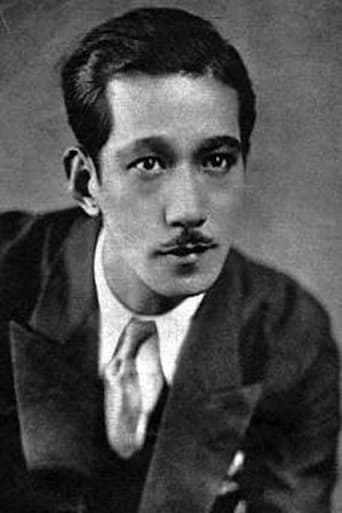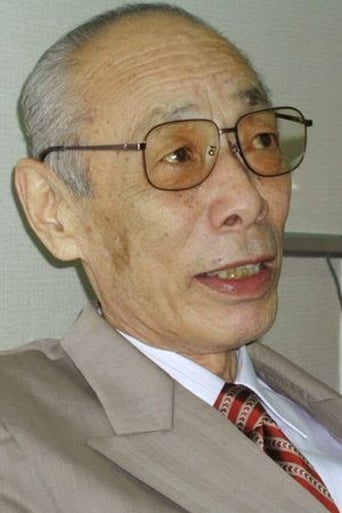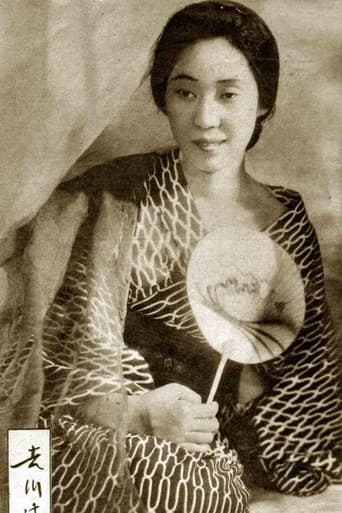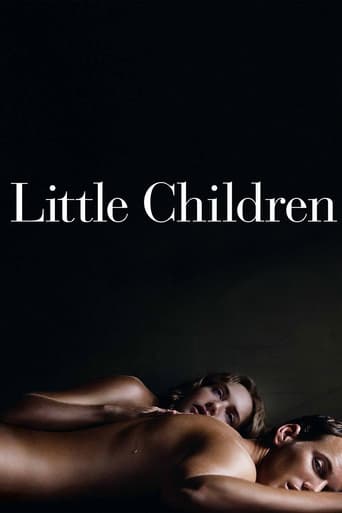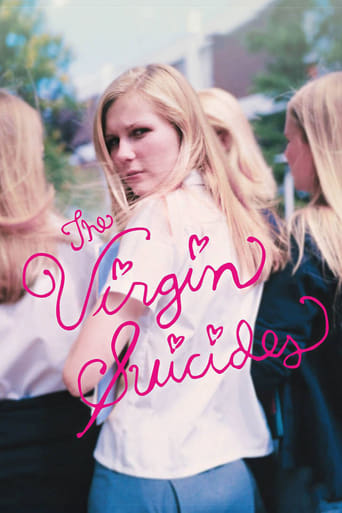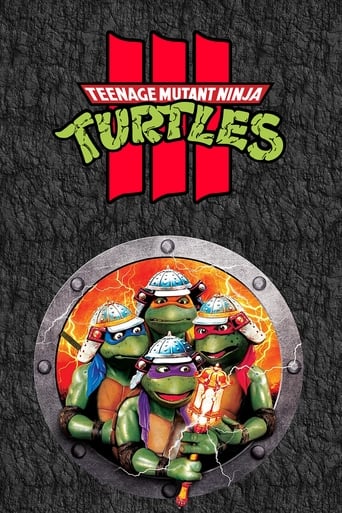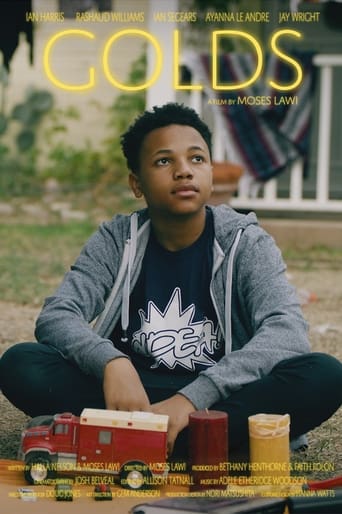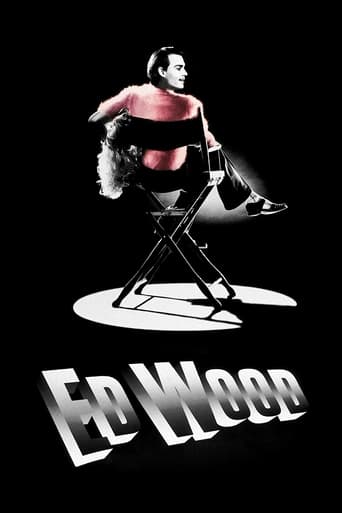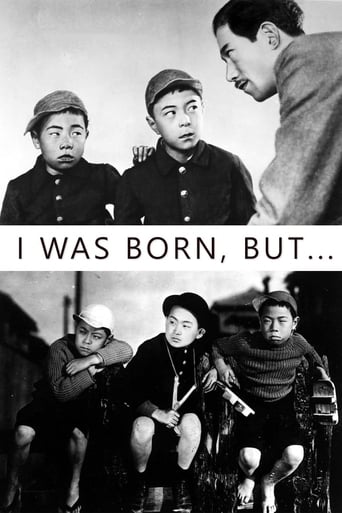
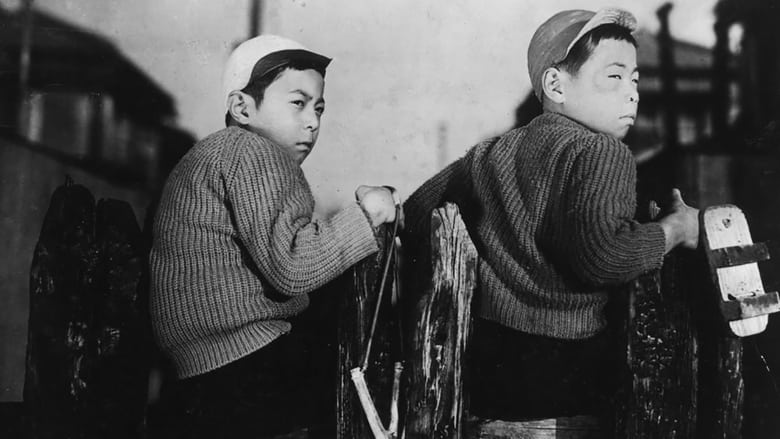
I Was Born, But... (1932)
Two young brothers become the leaders of a gang of kids in their neighborhood. Ozu's charming film is a social satire that draws from the antics of childhood as well as the tragedy of maturity.
Watch Trailer
Cast


Similar titles
Reviews
All of these films share one commonality, that being a kind of emotional center that humanizes a cast of monsters.
The movie's not perfect, but it sticks the landing of its message. It was engaging - thrilling at times - and I personally thought it was a great time.
The film's masterful storytelling did its job. The message was clear. No need to overdo.
This is one of the best movies I’ve seen in a very long time. You have to go and see this on the big screen.
I viewed 'I Was Born, But...' (one of the outstanding titles of all time by the way) later the same day/the evening I watched Good Morning for the first time. I'm not sure if my reaction would have varied considerably if I had seen one or the other far apart, or seen this first, but I found I liked I Was Born, But even more than Good Morning. Again, this is not to say there is a tremendous quality disparity between the two works, far from it, and you can tell the same man made both films. But I think there's more depth of feeling and less of that loose focus that, while charming, is what makes Good Morning what it is.You can tell in I Was Born, But... seeing it after the later version what was taken from where, yet at the same time it's not a remake exactly. They're cut from the same cloth, but Ozu's silent movie - not so much a comedy as it is a dramedy, of sorts - is focused much more on the children, and it's to the movie's benefit, and, naturally, the '32 film didn't (or simply couldn't) have the focus on new technology and sophisticated observations on communication. There's also the benefit of simplicity in its narrow way: we're following two brothers as they are moved to a new village by their father (played by a wonderfully laconic but tough when he needs to be Tatsuo Saito), and they have to deal with things a lot of kids have to deal with, which are fitting in to the new school, and... facing down bullies, and trying to see if they even want to go to school (late to class? eh, let's skip the whole day and eat our lunch somewhere, and get someone to forge our 'E' for Excellent grade), and then, eventually, becoming part of the group of kids after bonding over, what else, their fathers and, more specifically, who's the "best." Ozu's film is a satire (as, also, Good Morning was), but it's more dramatic than you might expect; years ago I thought this was like an early trifle, something that had kids and was cute and got a re-release at the art-house IFC theater because of the Ozu name and didn't bother to see it. I wish I had: this is full of depth of character, but it's different than what one gets in his other films (for one thing, unlike in Good Morning, to get specific, the father *does* give one of the brothers a spanking after he's run his mouth too long and cruelly, as, well, kids sometimes do). It's clear Ozu was still finding his voice, and maybe some parts of his style from his 50's and 60's work can be seen here, but what's thrilling for me is to come to this after seeing some of those acclaimed dramas and to see a film that has a lightness of spirit while being about serious things: boys and their image of their fathers, the physicality of being a boy (the brothers never fight each other, but how they move and bounce and do things with their hands is splendid), and masculinity and one's place in a society.At first I thought the whole movie would mostly be the boys, their this-and-that with the bullies who soon become friends with them as they bond over doing silly stuff (i.e. one of them pretends to be dead... not exactly the fart humor of Good Morning, but whatever, it works). But about halfway through the movie, there's a sequence I don't think I'll forget any time soon, where the father is with his boss at the company and some of the other employees (some may be fathers of the other kids, some not), and they're watching, after some other oddities like zebras, home-movies from at their job, doing silly things like making faces. The brothers' father does this, and suddenly things aren't amusing anymore. The father laughs with them, good naturedly, and it seems like the other kids are laughing who are there... and that makes it worse. The boys have questions for their father: why did he do that? Why is he a "nobody" at what he does despite what he tells his sons to do, which is to go to school to "Be Somebody"? Why isn't he the boss? The father tries to answer the best way he can, which is not good enough, and this leads to a tantrum from the boys, then the spanking, and then the remorse on both sides into the night.What was before in the first half a highly enjoyable film with little pockets of depth in the observations on how boys act with one another and becoming "part" of a group, turns into something that is about class and consciousness and becoming aware of what one really does in life - it's not a coming of age story exactly, but there is that element that, by the end, the kids have grown up a little and realized not everything is as they were taught before (which they kind of guessed, but they have it confirmed by their father who, by the way, seems unlike characters I see in Ozu films usually, which I loved). It's a story that finds creative and clever ways to go about its telling of these boys coming into their own in the world they're plopped in, which is a lower-middle class (if that's what it was, it was still the depression actually even in Japan), and how they have to navigate themselves, their father, the classmates, the school, everything.
This Ozu's early silent film was made when he was only 29, at a formative age, he has already acquired a keen eye on sieving the callous doctrine of the society's pecuniary pecking order through the lens of two kids' growing dismay and perplex. Two school-age brothers Ryoichi (Sugawara) and Keiji (Aoki) are moving to suburbs with their parents, a shrewd move of their father Yoshi (Saitô, a virtuoso player jostle between primness and clownishness) to hobnob with his boss Iwasaki (Sakamoto). With a good salary, they can afford a better life here, but the boys have some difficulty to find their feet, especially when they are picked on by school bullies, led by a bigger kid (Iijima), they play truant and laze around, ask an older delivery boy (Kofujita) to forge teacher's signature, all child's play and they would be reprimanded by Yoshi when the lid is blown off. Nevertheless, Ozu applies a very gentle touch and a ludic attention in limning the boys' daily expediency to tackle with their problems (there are not enough sparrow's eggs in the world to beat their bully), and eventually the scale would be tipped when they are wise enough to crack the knack of how to succeed in becoming an alpha dog, even Taro (Katô), Iwasaki's son, has to pay deference to the boys' whims. (a children's game but so rapier-like in its connotation linked to the power struggle in the adult world.) Then comes a blow, during a friends-gathering in Iwasaki's place, where films of daily vignettes are screened, a galling discovery would inflame the brothers' chutzpah to brazenly question their father's authority, "are you a successful person?", "why can't you be successful?", it is a blow to the brothers' unwitting but vaunted ego, which certainly doesn't tally with their young age, and is a corollary of a society spurred and indoctrinated by sheer competition and capitalism, even for kids, they are possessed with the idea of supremacy, power and hubris, which outstrips the parameter of childish mischief. In retrospect, the film grants us a gander into the frame-of-mind of a pre-WWII Japan, but not prescient enough to pinpoint a more perspicacious outlook, instead, an anodyne finale betrays Ozu's own perspective at that time. The children in the film are well-trained scamps, endearing to watch, especially Tomio Aoki as the younger brother, transforms the disadvantage of his less photogenic looks into something archly expressive with all the gurning, imitating and feigning, a farceur is in the making. A minor grouch to Donald Sosin's persistent attendant score, a relentless cascade of tunefulness can certainly overstay its welcome. Anyhow, a lesser comedy branded with Ozu's name is still worth visiting, not the least for the sake of his masterful tutelage and coordination of his exuberant pupils in front of the camera.
This movie is absolutely brilliant. Probably this is Ozu's first real masterpiece. Sure, I love his early comedies, like Days of Youth (1929), but this movie has got things to say, a real existential idea. Two kids are struggling through their boyhood, they think that their father must be the most influential man in the village, but soon everything changes. Father demands from children to have good grades in Calligraphy and Maths, if they want to become influential people, they have to do it. Soon kids manage to overcome obstacles and now they are the leaders of the gang. But father doesn't seems to be influential among his circle of friends and employees. At very early age, kids found out that if someone is rich, he can have more influence. Yes, life is unfair. Movie itself, is filmed very naturally, acting is good, of course nobody has doubt in Yasujiro's directing. Also, dialog is full with great one- liners and quotes. My favorite is: ,,What do you want to be in future? - Captain! - Why not General? - Because Ryoki wants to be a General and he's my older brother." Although ending is bright and hopeful, with smile on everybody's face, still this generation will face a great tragedy - World War II, but as the ending of the movie says: Life continues.
I am so glad that I ran into this movie. It left such an impression on me. The way it ended was so suprising. The boy's father was such a nice guy, and how that boy could be ashamed of him like that was really something else. It just left me in tears in the end of the movie. It makes me realize what our parents had to do to make a good living, even if it takes having to sell out your pride. His father did it because he loved his family. There is a lesson to be learned in this, and I would recommend this film in a heartbeat!


